We need your consent to use the individual data so that you can see information about your interests, among other things. Click "OK" to give your consent.
ASTM D387-00(2008)
Standard Test Method for Color and Strength of Chromatic Pigments with a Mechanical Muller
STANDARD published on 1.2.2008
The information about the standard:
Designation standards: ASTM D387-00(2008)
Note: WITHDRAWN
Publication date standards: 1.2.2008
SKU: NS-25156
The number of pages: 5
Approximate weight : 15 g (0.03 lbs)
Country: American technical standard
Category: Technical standards ASTM
The category - similar standards:
Annotation of standard text ASTM D387-00(2008) :
Keywords:
chromatic pigment, color, muller, Color--paints/related coatings/materials, Pigments (general properties), Tinting strength, Muller device, ICS Number Code 87.060.10 (Pigments and extenders)
Additional information
| Significance and Use | ||||||||||||||||
|
Color and tinting strength are the most important properties of a color pigment. This test method provides a means of testing these properties for quality control. This test method is intended as a referee method so that such matters as the vehicle for preparing the dispersions and the white for making tints have been suggested. However, other vehicles and whites may be suitable for quality control purposes, and changes in this test method are allowed by agreement between the parties to a test. It is assumed that the most exact comparison of mass color and tinting strength occurs when the pigment is completely dispersed. By following the procedure described in Annex A1, the conditions for achieving the maximum practical degree of dispersion with a mechanical muller may be determined. Color and strength tests should be carried out under these conditions. The results obtained with a mechanical muller do not necessarily correlate directly with an industrial situation where different dispersing conditions exist. However, dispersion with a mechanical muller is a quick and inexpensive way of testing the color and strength of a pigment for routine quality control. |
||||||||||||||||
| 1. Scope | ||||||||||||||||
|
1.1 This test method is intended to be used to compare the color and strength of a pigment under test with a reference standard of the same type and grade. 1.2 This test method does not apply to white pigments. Note 1—Test Method D 3022 is similar to this test method, but it utilizes a miniature sandmill rather than a mechanical muller, to disperse the chromatic pigment. Note 2—Test Method D 332 and Test Method D 2745 are similar to this test method, but they are intended for use with white pigments, rather than chromatic pigments. 1.3 The values stated in SI units are the preferred unit of measurement. The values given in parentheses are for information only. 1.4 This standard does not purport to address all of the safety concerns, if any, associated with its use. It is the responsibility of the user of this standard to establish appropriate safety and health practices and determine the applicability of regulatory limitations prior to use. Specific hazard statements are given in Section 8. |
||||||||||||||||
| 2. Referenced Documents | ||||||||||||||||
|
Similar standards:
Historical
15.4.2012
Historical
1.11.2013
Historical
1.6.2012
Historical
1.6.2011
Historical
1.6.2009
Historical
1.7.2009
We recommend:
Technical standards updating
Do you want to make sure you use only the valid technical standards?
We can offer you a solution which will provide you a monthly overview concerning the updating of standards which you use.
Would you like to know more? Look at this page.


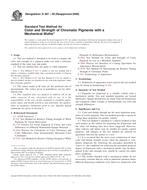
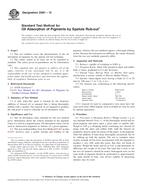 ASTM D281-12
ASTM D281-12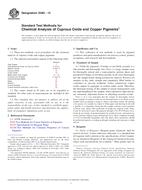 ASTM D283-13
ASTM D283-13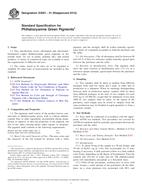 ASTM D3021-01(2012)..
ASTM D3021-01(2012).. ASTM D3022-84(2011)..
ASTM D3022-84(2011).. ASTM D3256-86(2009)..
ASTM D3256-86(2009)..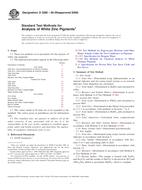 ASTM D3280-85(2009)..
ASTM D3280-85(2009)..
 Cookies
Cookies
